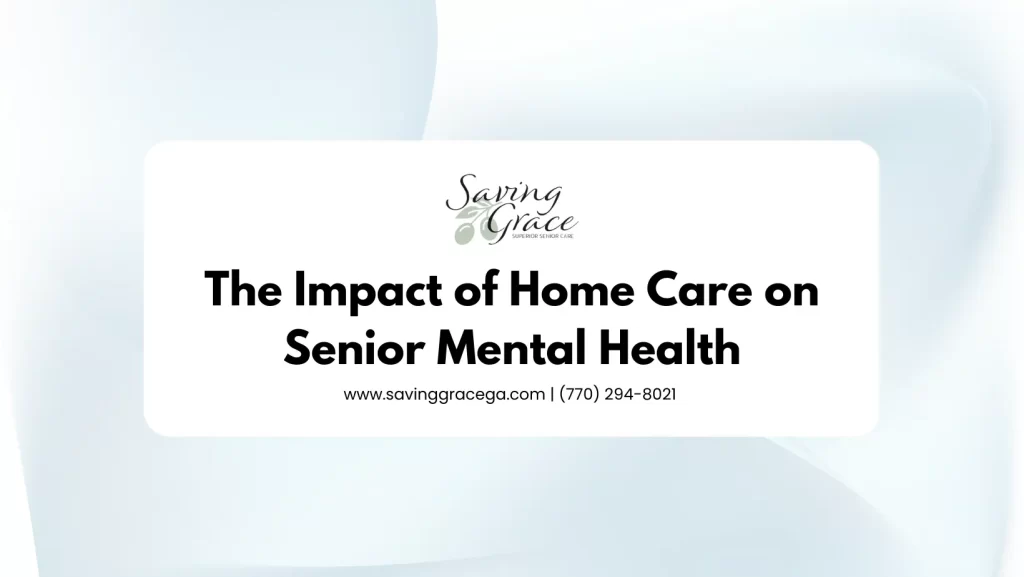Caring for a senior loved one can be a rewarding yet challenging experience for care on senior mental health. As we age, our mental and physical health may decline year on year. This is leading to increased levels of stress and anxiety for both the senior and the families.
Home care on senior mental health services can be a vital resource for families. Especially for people looking to support their seniors and improve their overall quality of life. It has a significant positive impact on the mental health of seniors.
In this article, we will understand the impact of home care on senior mental health. Besides all the positive outcomes it can bring.
Benefits of Home Care on Senior Mental Health
Home care services offer a wealth of benefits for seniors who want to age in place and maintain their independence. They offer seniors the opportunity to form meaningful relationships with their care providers.
Besides, receive care in a safe and familiar environment. With the right home care services, seniors can continue to live life on their own terms. it will be because of the existence of support and assistance they need to thrive.
Reduces stress and anxiety by Care on Senior Mental Health
Home care services can provide a sense of comfort and security for seniors. This assists in reducing the levels of stress and anxiety they may experience. A professional caregiver can assist with daily activities, reducing the burden on family members. Moreover, allowing seniors to feel more relaxed and secure with their new companions.
Improves social interaction
Home care services can provide seniors with opportunities for social interaction, helping to improve their mental well-being. Caregivers can accompany seniors on outings, engage in conversation, and participate in activities, helping to reduce feelings of loneliness and isolation.
Enhances self-esteem with home Care on Senior Mental Health
Having a caregiver assist with activities of daily living can help seniors maintain their independence and enhance their self-esteem. Caregivers can provide support and encouragement, helping seniors feel confident and valued.
Encourages physical activity
Physical activity is important for both physical and mental well-being. Home care services can provide seniors with opportunities for exercise, helping to improve their mood and reduce stress levels.
Promotes a positive outlook with Care on Senior Mental Health
Caregivers can bring a positive outlook and a sense of humor to their interactions with seniors. This will help elders to improve their mental well-being. A positive outlook can help seniors view their challenges in a more positive light and improve their overall quality of life.
Increases feelings of safety and security
Having a caregiver in the home can increase feelings of safety and security for seniors. Thus helping elders to improve their mental well-being. Caregivers can assist with activities such as bathing, dressing, and toileting, reducing the risk of falls and other accidents.
Risk Factors for Low Mental Health in Seniors
As we age, it’s natural for our mental health to become a concern. Mental health affects our overall well-being, happiness, and quality of life. Unfortunately, many seniors face an increased risk of low mental health due to various factors. Understanding these risk factors and taking steps to mitigate them is crucial in maintaining good mental health in our golden years.
Hence, it is important to understand that these risk factors can be addressed and prevented with the right support and resources. Family members and Care on Senior Mental Health can help by providing social interaction, managing medications, and ensuring their loved ones have access to resources.
Being well equipped help them maintain good mental health. Consider reaching out to a professional home care Care on Senior Mental Health service provider to look after them. So you can ensure that your loved one has access to the resources. Furthermore, adequate support can be needed to maintain good mental health in Hoschton, GA.
Chronic Illness and Physical Health Problems
One of the major risk factors for low mental health in seniors is chronic illness and physical health problems. The experience of chronic pain, difficulty with mobility, and frequent doctor visits could cause sadness, hopelessness, and low self-esteem. Additionally, many chronic illnesses can impact a senior’s ability to carry out activities of daily living often. This is leading to feelings of isolation, loneliness, and decreased social interaction.
Social Isolation and Loneliness
Social isolation and loneliness is another major risk factor for low mental health in seniors. This can occur when seniors experience a loss of friends and family members due to death or distance. Some other ways are as a result of physical or mental health issues that prevent them from participating in social activities. Loneliness can lead to feelings of sadness, hopelessness, and can even increase the risk of depression.
Loss and Grief
Loss and grief is another risk factor for low mental health in seniors. This can be due to the death of a spouse or loved one, or the loss of a pet. Grief can be a difficult and overwhelming experience for seniors to manage. Thus, leading to feelings of sadness, hopelessness, and a decreased sense of purpose.
Cognitive Decline
Cognitive decline is another risk factor for low mental health in seniors. This can result in confusion, disorientation, and memory loss, which can lead to feelings of fear, anxiety, and frustration. Cognitive decline can also make it more difficult for seniors to participate in activities. As they previously enjoyed life, however now leading to feelings of loneliness and isolation.
Financial Strain
Financial strain is another risk factor for low mental health in seniors. This can be due to limited income, the rising cost of living, or the cost of home health care. Financial strain can lead to feelings of stress, anxiety, and hopelessness, as well as a decreased sense of security and live independently.
Supportive Strategies for Seniors With Home Care on Senior Mental Health
Caring for a senior loved one can be a challenging and demanding experience. With an aging population, more families are turning to home care as a solution to support older adults in their later years. Home care provides a range of services designed to help seniors maintain their, Personal care, independence and dignity. It is done while ensuring they receive the support and care they need from a home caregiver.
However, the emotional impact of home care on seniors can often be overlooked. In this article, we’ll find the various strategies and approaches that can help seniors and how Care on Senior Mental Health can be helpful. As such strategies can cope with the emotional challenges of home care and promote their overall well-being.
Building Strong Relationships with Caregivers
One of the most important strategies for supporting seniors with home care is building strong relationships with their caregivers. This includes taking the time to get to know each other, and fostering a sense of trust and respect. When seniors feel comfortable and secure with their caregivers, they are more likely to open up and share their thoughts, feelings, and needs. This can lead to better care, improved health outcomes, and a greater sense of well-being with a better level of assistance.
Encouraging Active Engagement in Activities
Another key strategy for supporting seniors with home care is encouraging active engagement in activities they enjoy. Whether it’s reading, gardening, or playing games, seniors should have the opportunity to participate in activities.
As that brings them joy and a sense of purpose. This can help to improve their mental health and overall well-being. Furthermore, this can also provide a sense of routine and structure to their day.
Providing Emotional Support by Care on Senior Mental Health
Emotional support is also critical for seniors with home care. This can include listening to their concerns, offering encouragement, and providing comfort and reassurance during times of stress and uncertainty. Families and caregivers should make an effort to understand the emotional needs of seniors. Besides, it should be available to provide support and comfort when needed.
Encouraging Independence
Encouraging independence is another key strategy for supporting seniors with home care. This can include helping them maintain their ability to carry out activities of daily living. Such as dressing, eating, etc as well as providing opportunities for them to continue to participate in the activities they enjoy. Independence can help seniors maintain their dignity and sense of self-worth, and can also improve their overall well-being.
Supporting Their Physical Health by providing Care on Senior Mental Health
Finally, supporting the physical health of seniors with home care is essential for overall well-being. This can include encouraging them to exercise regularly, eat a healthy and balanced diet, and get plenty of rest. Regular monitoring of their physical health by a healthcare provider can help to catch and treat health problems early on. Furthermore, it can help seniors to maintain their physical and mental health.
By adopting supportive strategies and approaches, seniors can be helped to cope with the challenges of home care. Hence it will be easy to maintain their mental and emotional well-being. We encourage you to try these strategies with your senior loved one to see the positive impact.
As they can experience the benefit of their overall quality of life. A unique reason to try these strategies is that they can help to strengthen the bond between you and your senior. This leads you to a more meaningful and fulfilling caregiving experience.
Reducing Barriers to Accessing Home Care on Senior Mental Health
Home care is a crucial aspect of providing support to seniors and those in need. However, many families face barriers in accessing the care they require. The stress and uncertainty of navigating the home care system can be overwhelming. This is why it’s essential to identify and address the barriers that may prevent individuals from receiving the care they need.
By identifying and addressing barriers to accessing care, families can provide the support their loved ones require. It is time to take action and make the necessary changes for seniors. As to ensure that everyone has access to quality home care on Senior Mental Health services. By doing so, we can improve the quality of life for seniors and those in need.
- Financial Concerns: Cost is a significant barrier for many families. Home care subsidies and government-funded programs can help make care more affordable.
- Lack of Awareness: Familiarizing yourself with the home care options available can help reduce barriers.
- Navigating the System: Understanding the application and eligibility processes can help make the process smoother.
- Provider Availability: Finding a trustworthy and reliable care provider can be challenging. Seeking recommendations and reading reviews can help.
- Communication Barriers: Language and cultural differences can make accessing home care difficult. Working with organizations that cater to diverse communities can help bridge the gap.
Reach out to organizations and resources that can help reduce the barriers and provide support. By doing so, you’ll provide your loved ones with the care they need. Furthermore, also help ensure that the home care system is accessible for all.

